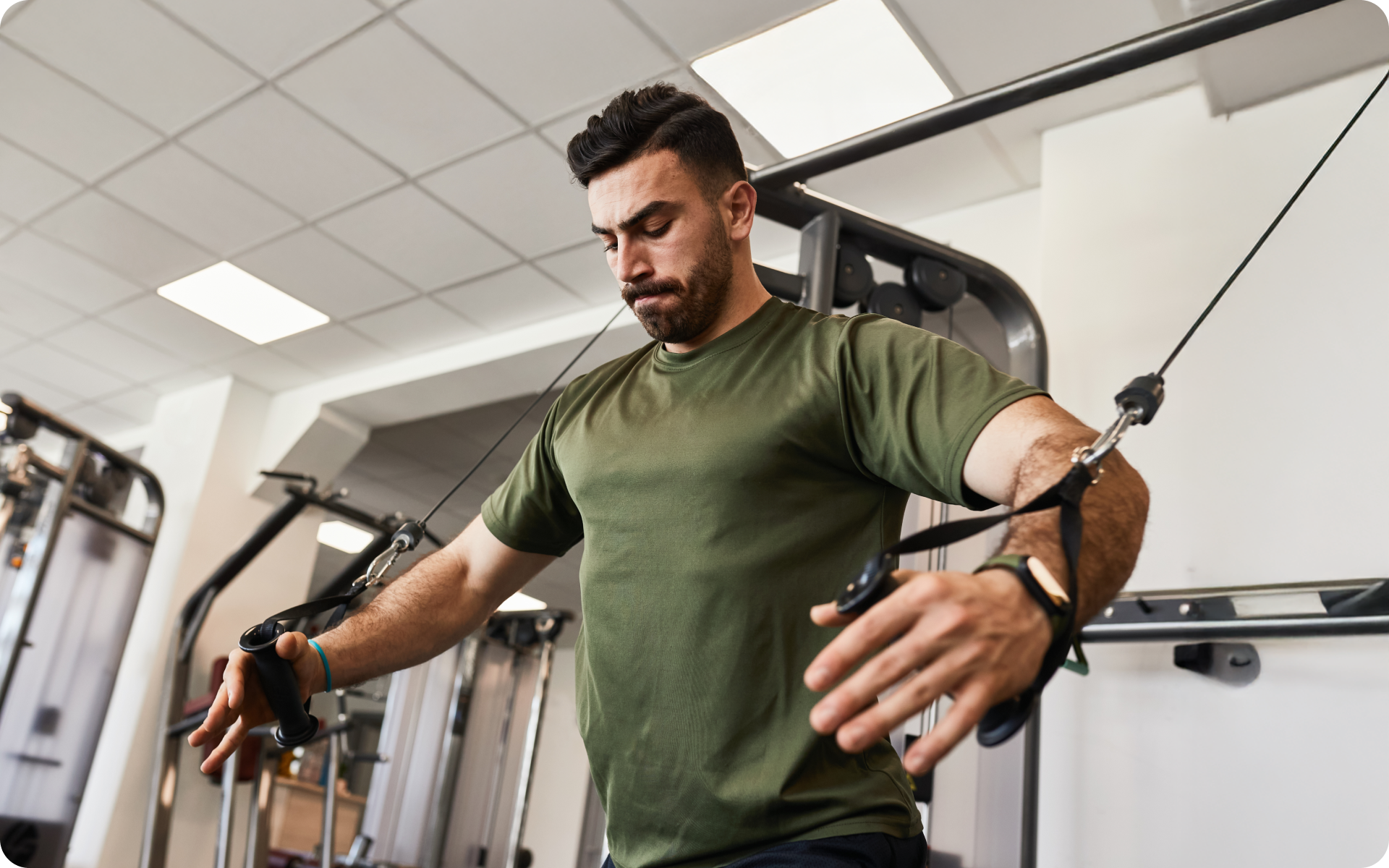The bench press is one of the most renowned and time-honored exercises in strength training. It’s the ultimate test of upper body strength; many strive to lift heavier and heavier weights over time.
A common goal is to bench press one’s bodyweight. This shows not just brute strength, but also dedication to training and the development of the chest, shoulders, and triceps.
To some, it’s a rite of passage in the world of weightlifting.
But is benching your bodyweight the definitive measure of upper body strength, or are there more comprehensive methods to gauge your strength?
Here’s what you need to know.
Can An Average Man Bench His Body Weight?
No; the average untrained man cannot bench press his own bodyweight. Assuming an average weight of 180 pounds (81.6 kg), a novice lifter may struggle to bench press even half their bodyweight.
Studies have shown that untrained individuals can achieve a one-rep max bench press of approximately 0.8 times their bodyweight.
This means that an average man may be able to bench press around 144 pounds (65.3 kg).
However, with proper training and dedication, a man can increase his strength over time and eventually reach the coveted one-rep max of his bodyweight.
Multiple factors determine an individual’s bench press strength:
Gender
Men, on average, have more upper body strength than women due to biological and physiological differences. This means that an average man is able to lift more weight in a bench press compared to an average woman (1).
Age
Age and strength go hand in hand; as we age, our strength declines due to muscle loss and decreased hormone production (2). In your 20’s it’s possible to bench press more than your body weight, but as you reach 40’s and beyond, this may become increasingly challenging.
Training Background
Regular training can significantly improve an individual’s bench press strength. Consistent and progressive training helps build muscle mass, strengthen connective tissues, and improve technique.
Furthermore, individuals with a background in sports or physical activity may have an advantage as they likely have developed more upper body strength and muscle mass.
If you struggle to even flirt with the idea of giving up your favorite foods or working out till your legs give way – BetterMe app is here to breathe a fresh perspective into the way you view the weight loss process! Check out the app and experience the fun side of fitness and dieting with BetterMe!
Weight and Body Composition
Bodyweight alone is not a comprehensive measure of strength. Individuals with higher body fat may struggle to bench press their own weight, while someone with a lower body fat percentage may find it easier.
Muscle mass also plays a crucial role in strength; individuals with more muscle mass are likely to have greater upper body strength compared to those with less muscle mass, even if their body weight is the same (3).
Also; the more you weigh the higher your bench press target (if your goal is to bench press your bodyweight). A 250-pound man has a longer way to go to bench press 250 pounds compared to a 150-pound man.
How Much Should I Bench for My Weight?
Most experts recommend using how long you’ve been training as a guideline for bench press goals rather than body weight.
Beginner (less than 12 months of consistent training)
For beginners, the focus should be on mastering proper form and technique rather than lifting heavy weights. Start with the bar (45 pounds) and gradually increase the weight over time.
Your goal should be to bench press half your bodyweight, but to get there, you’ll first need to build a foundation of strength and proper form.
Intermediate (12 months to 3 years of consistent training)
For intermediate lifters, a benchmark goal is to bench press your bodyweight for a one-rep max. This may take some time depending on your starting point, but it’s a realistic goal to strive for.
Also, aim to increase your strength in other upper body exercises, such as push-ups and shoulder presses, which will also help improve your bench press.
Eventually, lifting up to 1.25 times your bodyweight is a good indicator of superior upper body strength for most people.
Advanced (more than 3 years of consistent training)
At this level, you should have a solid foundation of strength and proper form. Aiming to bench press 1.5 to 2 times your bodyweight or more is a challenging but achievable goal.
Continuing to improve your overall upper body strength, including improving technique and incorporating different variations of the bench press, will help you reach this goal.
Our, bench workouts article, has detailed bench press workouts you can try.
How Much Should I Bench If I Weigh 150?
At 150lbs, a beginner should aim to lift 93-132 lbs, an intermediate should aim for 182lbs and an advanced lifter could aim for 225-300 lbs depending on their training experience and overall strength.
These numbers are estimates you may use to set a goal to work towards and stay motivated. However, they shouldn’t be taken as the only measure of strength.
Remember that proper form and technique, consistent training, and overall functional strength are more important than just lifting a certain amount of weight.
Here’s a table showing estimated one-rep max bench press based on bodyweight and training experience:
| Bodyweight | Beginner | Novice | Intermediate | Advanced | Elite |
|---|---|---|---|---|---|
| 110 | 53 | 84 | 125 | 173 | 226 |
| 120 | 63 | 97 | 140 | 191 | 247 |
| 130 | 73 | 109 | 154 | 208 | 266 |
| 140 | 83 | 121 | 169 | 224 | 285 |
| 150 | 93 | 133 | 182 | 240 | 302 |
| 160 | 102 | 144 | 196 | 255 | 319 |
| 170 | 112 | 155 | 209 | 270 | 336 |
| 180 | 121 | 166 | 221 | 284 | 352 |
| 190 | 130 | 177 | 234 | 298 | 367 |
| 200 | 139 | 187 | 246 | 312 | 382 |
| 210 | 148 | 197 | 257 | 325 | 382 |
| 220 | 156 | 207 | 269 | 338 | 411 |
| 230 | 165 | 217 | 280 | 350 | 425 |
| 240 | 173 | 227 | 291 | 362 | 438 |
| 250 | 181 | 236 | 301 | 374 | 451 |
| 260 | 190 | 245 | 312 | 386 | 464 |
| 270 | 197 | 254 | 322 | 397 | 476 |
| 280 | 205 | 263 | 332 | 408 | 488 |
| 290 | 213 | 272 | 341 | 419 | 500 |
| 300 | 220 | 280 | 351 | 429 | 511 |
| 310 | 228 | 289 | 360 | 439 | 523 |
We’ve discussed how this information can be applied in your workouts in our, average bench press by age blog.
How Many Times Should You Be Able To Bench Your Bodyweight?
A good benchmark to be able to bench press your bodyweight for 3-5 reps. However, many factors come into play, such as training experience, age, and genetics.
If it’s your first time attempting a certain weight, always play it safe by starting with 1 rep, and then gradually increasing the number of reps as you become more comfortable and confident with the weight. Always have a spotter and NEVER use safety pins when lifting heavy bench press alone. It is important that in an emergency you can tip the bar and slide the plates off to unpin yourself from under a missed rep.
Make sure you’re not pushing yourself too hard, as this can lead to injuries.
Read more: Calisthenics Warm Up 101: Bodyweight Exercises To Get Your Blood Flowing Before Your Workout
Alternatives To Bench Pressing Your Bodyweight
While bench pressing your bodyweight is undoubtedly an impressive feat, it’s not the only way to measure upper body strength.
Other exercises and methods can give a more comprehensive understanding of one’s strength, including:
Push Ups
Unlike the bench press; push ups indicate relative strength. Relative strength is your strength in relation to your body weight. It’s a good indicator of overall strength.
Push ups also engage multiple muscle groups and require more stability and core engagement, making them a more functional exercise.
Pull Ups
Pull ups are another effective bodyweight exercise that tests upper body strength. They require significant back, arm, and core strength, making them an excellent measure of overall strength.
One Rep Max (1RM) Testing
While the bench press is often used to determine one’s 1RM, it’s not the only exercise that can do so. Testing your 1RM in other upper body exercises such as the overhead press or dumbbell chest press can provide a more comprehensive understanding of your strength (4).
Whether you’re a workout beast or just a beginner making your first foray into the world of fitness and dieting – BetterMe has a lot to offer to both newbies and experts! Install the app and experience the versatility first-hand!
FAQs
Is 100% Bodyweight Bench Good?
100% bodyweight bench press is a good goal to work towards; it shows a solid foundation of strength and overall functional upper body strength.
However, it should be viewed as something to work towards, not an innate measure of strength. Proper form, technique, and overall functional strength are more important than just lifting a certain amount of weight.
Is Benching 80% Of Body Weight Good?
Benching 80% body weight is impressive. It takes a fair amount of training and strength to reach this goal. It’s also a good indicator that one has achieved a solid level of overall upper body strength.
Is Benching 70% Of Body Weight Good?
Benching 70% bodyweight is a good goal to work towards for beginners and those new to lifting. It shows progress in building upper body strength and functional strength.
Is 1.5 Times Bodyweight Bench Good?
1.5 times body weight is an impressive bench press for most people. It shows a high level of upper body strength and overall functional strength. Advanced lifters who’ve spent years consistently training can often reach this goal.
The Bottom Line
Bench pressing your own bodyweight is a notable achievement, but it’s not the only way to assess upper body strength. Various factors such as gender, age, training background, and body composition play a role in an individual’s bench press strength.
In addition, alternative exercises like push ups and pull ups can give a more comprehensive understanding of overall strength. In the end, what matters most is consistent training, progress, and striving to improve one’s strength and overall fitness.
DISCLAIMER:
This article is intended for general informational purposes only and does not serve to address individual circumstances. It is not a substitute for professional advice or help and should not be relied on for making any kind of decision-making. Any action taken as a direct or indirect result of the information in this article is entirely at your own risk and is your sole responsibility.
BetterMe, its content staff, and its medical advisors accept no responsibility for inaccuracies, errors, misstatements, inconsistencies, or omissions and specifically disclaim any liability, loss or risk, personal, professional or otherwise, which may be incurred as a consequence, directly or indirectly, of the use and/or application of any content.
You should always seek the advice of your physician or other qualified health provider with any questions you may have regarding a medical condition or your specific situation. Never disregard professional medical advice or delay seeking it because of BetterMe content. If you suspect or think you may have a medical emergency, call your doctor.
SOURCES:
- A Comparison between Male and Female Athletes in Relative Strength and Power Performances (2021,nih.gov)
- Age and muscle loss (2003,harvard.edu)
- The Importance of Muscular Strength in Athletic Performance (2016,nih.gov)
- The reliability of the 1RM strength test for untrained middle-aged individuals (2007,researchgate.net)









